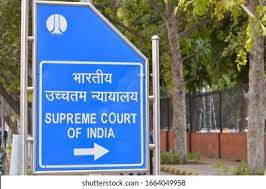(A) Criminal Procedure Code, 1973, Section 482 – Penal Code, 1860, Section 153A(1)(a) – Quashing of FIR – Spreading Hate – Words used by the appellant on his WhatsApp status, that August 5 is a Black Day for Jammu and Kashmir – 5th August 2019 is the day on which Article 370 of the Constitution of India was abrogated, and two separate Union territories of Jammu and Kashmir were formed – Further, the appellant has posted that “Article 370 was abrogated, we are not happy” – Held that on a plain reading, the appellant intended to criticise the action of the abrogation of Article 370 of the Constitution of India – He has expressed unhappiness over the said act of abrogation – The aforesaid words do not refer to any religion, race, place of birth, residence, language, caste or community – It is a simple protest by the appellant against the decision to abrogate Article 370 of the Constitution of India and the further steps taken based on that decision – It does not reflect any intention to do something which is prohibited under Section 153-A – The Constitution of India, under Article 19(1)(a), guarantees freedom of speech and expression – Under the said guarantee, every citizen has the right to offer criticism of the action of abrogation of Article 370 or, for that matter, every decision of the State – He has the right to say he is unhappy with any decision of the State – The effect of the words used by the appellant on his WhatsApp status will have to be judged from the standards of reasonable women and men – Cannot apply the standards of people with weak and vacillating minds – . Merely because a few individuals may develop hatred or ill will, it will not be sufficient to attract clause (a) of sub-section (1) of Section 153-A of the IPC. (Para 9 to 11)
(B) Criminal Procedure Code, 1973, Section 482 – Penal Code, 1860, Section 153A(1)(a) – Quashing of FIR – Spreading Hate – Picture by the appellant on his WhatsApp status containing “Chand” and below that the words “14th August – Happy Independence Day Pakistan” – Held that it will not attract clause (a) of subsection (1) of Section 153-A of the IPC. -Every citizen has the right to extend good wishes to the citizens of the other countries on their respective independence days – If a citizen of India extends good wishes to the citizens of Pakistan on 14th August, which is their Independence Day, there is nothing wrong with it – It’s a gesture of goodwill – In such a case, it cannot be said that such acts will tend to create disharmony or feelings of enmity, hatred or ill-will between different religious groups – Motives cannot be attributed to the appellant only because he belongs to a particular religion – Clause (b) of sub-section (1) of Section 153-A of the IPC will not be attracted as what is depicted on the WhatsApp status of the appellant cannot be said to be prejudicial to the maintenance of harmony among various groups as stated therein – Continuation of the prosecution of the appellant for the offence punishable under Section 153-A of the IPC will be a gross abuse of the process of law – Impugned judgment of the High Court liable to be set aside and the impugned FIR and the proceedings based on the impugned FIR liable to be quashed. (Para 12, 14 and 15)
SUPREME COURT OF INDIA
2024 STPL(Web) 156 SC
[2024 INSC 187]
Javed Ahmad Hajam Vs. State Of Maharashtra & Anr
Criminal Appeal No. 886 of 2024 (Arising out of Special Leave Petition (Crl.) No.11122 of 2023)-Decided on 07-03-2024
https://stpllaw.in/wp-content/uploads/2024/04/2024-STPLWeb-156-SC.pdf







